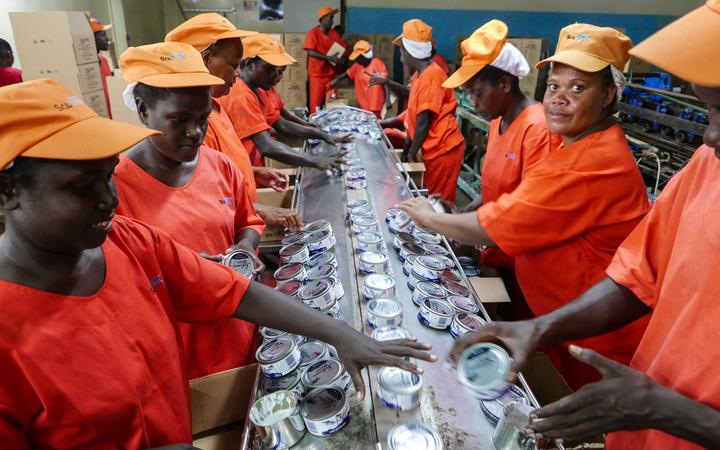Solomons tuna plant could establish thousands of new jobs
Wednesday 4 May 2022 | Written by RNZ | Published in Regional, Solomon Islands

Tuna being loaded into a carrier vessel (file image) Photo: Francisco Blaha
Solomon Islands and the International Finance Corporation (IFC) are to work together to develop a world class tuna processing plant in Malaita Province that could create employment opportunities for more than 5,500 people.
The Bina Harbour Tuna Processing Plant will be built under a public private partnership (PPP) and is expected to generate up to $US40 million in foreign investment for the government.
Minister for Fisheries and Marine Resources, Nestor Giro, said the project will "create employment, derive more benefit from our sovereign tuna resource, and add an important Solomon Island contribution to our economy."
"[The government's] vision is that Bina Harbor will grow beyond this project to become the country's first climate resilient international shipping port," Giro said.
The processing plant is expected to create 1,600 jobs in Malaita - mostly for women - with a further 4,000 jobs created indirectly on the back of growth in related industries.
Solomon Islands tuna accounts for around seven percent of the total Western and Central Pacific Ocean catch - more than 150,000 tonnes - with an estimated value of US$180 million.
However, most of the tuna that is caught is taken by foreign fishing vessels under licensing agreements and processed elsewhere due to the lack of onshore processing capacity.

"Under the proposed PPP, long-term fishing rights will be allocated to the investor that constructs and operates the plant. The processing plant will not only support growth of Solomon Islands' tuna fisheries industry but also make it more competitive and better secure access to key markets in Europe and elsewhere," the IFC said.
"It's expected the tuna industry will be able to charge a premium through sustainability and best labour practice certification."
World class facility says premier
Malaita Province Premier, Daniel Suidani said it was a great opening for his province.
"The Bina Harbour project offers the opportunity for a world class tuna processing facility based on sustainable resources at a climate resilient port, offering opportunities for quality employment and diversifying our province's economy."
The IFC - a member of the World Bank Group - said the project is supported by the governments of Australia and New Zealand and is seen as transformative for Solomon Islands.
The New Zealand government is supporting the project as part of its long-term support to the fisheries sector in Solomon Islands.
Through the Ministry of Foreign Affairs and Trade it has been funding early engagement with the Bina landowners and work of an interim Project Management Office.
The IFC said New Zealand is "now scaling up this support and is currently procuring a Bina Harbour Project Office to drive work at the site, as well as working with the Solomon Islands government on a new package of support to engage with landowners at Bina."
Acting high commissioner to Solomon Islands, Don Higgins, said New Zealand is in it for the long haul and sees Bina as a critical part of its partnership with Solomons.
Higgins said the Bina Harbour Project Office will help to bring all stakeholders together and they are looking forward to seeing this critical project progress.
IFC's manger Asia Pacific PPP Transaction Advisory Team, Thomas Lubeck, said the project will have a significant impact on the livelihood of Solomon Islanders.
"This project has the potential to change people's lives in Solomon Islands, creating jobs and sustainable growth at a time when the nation has been hit hard by the impacts of the Covid-19 pandemic," Lubeck said.














































